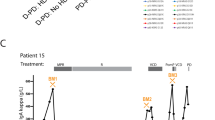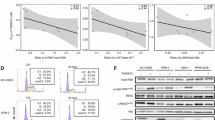Abstract
The exposure to pesticides and toxic compounds in xenobiotic transport and metabolism genes has been shown to affect risk of developing multiple myeloma (MM). Therefore, we hypothesized that genetic variations in xenobiotic transport and metabolism regulator genes PXR (NR1I2) and CAR (NR1I3) could determine a difference in MM susceptibility. Ten tagging single-nucleotide polymorphisms (SNPs) for PXR and seven for the CAR genes were selected and genotyped in 627 MM cases and 883 controls collected in the context of the International Multiple Myeloma rESEarch (IMMEnSE) consortium. None of the 17 SNPs investigated showed significant association with MM risk either alone or when combined in haplotypes. Significant SNP–SNP interactions were not found, neither with 58 previously genotyped polymorphisms in ABC transporters. We can therefore exclude that common genetic variants in the xenobiotic transport and metabolism regulator genes PXR and CAR affect MM risk.
Similar content being viewed by others
Log in or create a free account to read this content
Gain free access to this article, as well as selected content from this journal and more on nature.com
or
References
Ferlay, J., Shin, H. R., Bray, F., Forman, D., Mathers, C. & Parkin, D. M. GLOBOCAN 2008 v2.0, Cancer Incidence and Mortality Worldwide: IARC CancerBase No. 10 [Internet], International Agency for Research on Cancer: Lyon, France, (2010) Available from: http://globocan.iarc.fr).
Kyle, R. A., Therneau, T. M., Rajkumar, S. V., Larson, D. R., Plevak, M. F. & Melton, L. J. Long-term follow-up of 241 patients with monoclonal gammopathy of undetermined significance: the original Mayo Clinic series 25 years later. Mayo Clin. Proc. 79, 859–866 (2004).
Landgren, O., Kyle, R. A., Hoppin, J. A., Beane Freeman, L. E., Cerhan, J. R., Katzmann, J. A. et al. Pesticide exposure and risk of monoclonal gammopathy of undetermined significance in the Agricultural Health Study. Blood 113, 6386–6391 (2009).
Lope, V., Perez-Gomez, B., Aragones, N., Lopez-Abente, G., Gustavsson, P., Plato, N. et al. Occupation, exposure to chemicals, sensitizing agents, and risk of multiple myeloma in Sweden. Cancer Epidemiol. Biomarkers Prev. 17, 3123–3127 (2008).
Koutros, S., Alavanja, M. C., Lubin, J. H., Sandler, D. P., Hoppin, J. A., Lynch, C. F. et al. An update of cancer incidence in the Agricultural Health Study. J. Occup. Environ. Med. 52, 1098–1105 (2010).
Perrotta, C., Staines, A. & Cocco, P. Multiple myeloma and farming. A systematic review of 30 years of research. Where next? J. Occup. Med. Toxicol. 3, 27 (2008).
Pahwa, P., Karunanayake, C. P., Dosman, J. A., Spinelli, J. J., McDuffie, H. H. & McLaughlin, J. R. Multiple myeloma and exposure to pesticides: a Canadian case-control study. J. Agromed. 17, 40–50 (2011).
Landgren, O. & Weiss, B. M. Patterns of monoclonal gammopathy of undetermined significance and multiple myeloma in various ethnic/racial groups: support for genetic factors in pathogenesis. Leukemia 23, 1691–1697 (2009).
Lincz, L. F., Kerridge, I., Scorgie, F. E., Bailey, M., Enno, A. & Spencer, A. Xenobiotic gene polymorphisms and susceptibility to multiple myeloma. Haematologica 89, 628–629 (2004).
Martino, A., Sainz, J., Buda, G., Jamroziak, K., Reis, R. M., Garcia-Sanz, R. et al. Genetics and molecular epidemiology of multiple myeloma: the rationale for the IMMEnSE consortium (review). Int. J. Oncol. 40, 625–638 (2011).
Martino, A., Campa, D., Buda, G., Sainz, J., Garcia-Sanz, R., Jamroziak, K. et al. Polymorphisms in xenobiotic transporters ABCB1, ABCG2, ABCC2, ABCC1, ABCC3 and multiple myeloma risk: a case-control study in the context of the International Multiple Myeloma rESEarch (IMMEnSE) consortium. Leukemia 26, 1419–1422 (2011).
Hernandez, J. P., Mota, L. C. & Baldwin, W. S. Activation of CAR and PXR by dietary, environmental and occupational chemicals alters drug metabolism, intermediary metabolism, and cell proliferation. Curr. Pharmacogenomics Person. Med. 7, 81–105 (2009).
Zhang, B., Xie, W. & Krasowski, M. D. PXR: a xenobiotic receptor of diverse function implicated in pharmacogenetics. Pharmacogenomics 9, 1695–1709 (2008).
Lamba, J. K. Pharmacogenetics of the constitutive androstane receptor. Pharmacogenomics 9, 71–83 (2008).
Timsit, Y. E. & Negisi, M. CAR and PXR: the xenobiotic-sensing receptors. Steroids 72, 231–246 (2007).
Campa, D., Martino, A., Sainz, J., Buda, G., Jamroziak, K., Weinhold, N. et al. Comprehensive investigation of genetic variation in the 8q24 region and multiple myeloma risk in the IMMEnSE consortium. Br. J. Haematol. 157, 331–338 (2012).
Martino, A., Campa, D., Jamroziak, K., Reis, R. M., Sainz, J., Buda, G. et al. Impact of polymorphic variation at 7p15.3, 3p22.1 and 2p23.3 loci on risk of multiple myeloma. Br. J. Haematol. 158, 805–809 (2012).
International Myeloma Working Group. Criteria for the classification of monoclonal gammopathies, multiple myeloma and related disorders: a report of the International Myeloma Working Group. Br. J. Haematol. 121, 749–757 (2003).
Gao, X., Starmer, J. & Martin, E. R. A multiple testing correction method for genetic association studies using correlated single nucleotide polymorphisms. Genet. Epidemiol. 32, 361–369 (2008).
Chen, B., Wilkening, S., Drechsel, M. & Hemminki, K. SNP_tools: A compact tool package for analysis and conversion of genotype data for MS-Excel. BMC Res. Notes 2, 214 (2009).
Stephens, M. & Scheet, P. Accounting for decay of linkage disequilibrium in haplotype inference and missing-data imputation. Am. J. Hum. Genet. 76, 449–462 (2005).
Stephens, M., Smith, N. J. & Donnelly, P. A new statistical method for haplotype reconstruction from population data. Am. J. Hum. Genet. 68, 978–989 (2001).
Moore, J. H. Computational analysis of gene-gene interactions using multifactor dimensionality reduction. Expert Rev. Mol. Diagn. 4, 795–803 (2004).
Acknowledgements
We thank for the support by the recruiting hospitals and physicians of the study regions, as well as their collaborating nurses and technicians.
Author contributions
AM, DC and FC designed the study, performed the genotyping and the statistical analysis and wrote the original draft of the manuscript. AS performed the genotyping. JS, RMR, VM, GB, FL, HM, RG-S, RR, CD, FG, AMR, SL, MJ, MP and KJ recruited cases and controls and provided DNA samples and the clinical information. All the authors approved the final version submitted.
Author information
Authors and Affiliations
Corresponding author
Ethics declarations
Competing interests
The authors declare no conflict of interest.
Additional information
Supplementary Information accompanies the paper on Journal of Human Genetics website
Supplementary information
Rights and permissions
About this article
Cite this article
Martino, A., Sainz, J., Manuel Reis, R. et al. Polymorphisms in regulators of xenobiotic transport and metabolism genes PXR and CAR do not affect multiple myeloma risk: a case–control study in the context of the IMMEnSE consortium. J Hum Genet 58, 155–159 (2013). https://doi.org/10.1038/jhg.2012.149
Received:
Revised:
Accepted:
Published:
Issue date:
DOI: https://doi.org/10.1038/jhg.2012.149
Keywords
This article is cited by
-
Genetic predisposition for multiple myeloma
Leukemia (2020)



